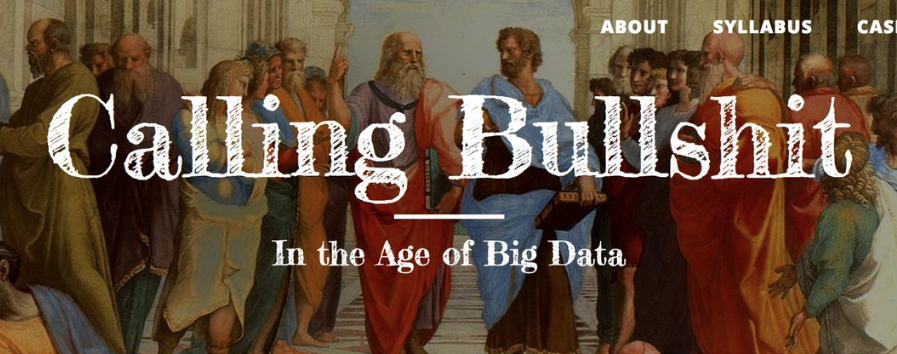
Two professors at the University of Washington, Carl Bergstrom and Jevin West, have created a website meant to accompany a potential college seminar entitled “Calling Bullshit.” Here’s how Bergstrom and West explain the premise of their course. It’s worth quoting them at length.
The world is awash in bullshit. Politicians are unconstrained by facts. Science is conducted by press release. Higher education rewards bullshit over analytic thought. Startup culture elevates bullshit to high art. Advertisers wink conspiratorially and invite us to join them in seeing through all the bullshit — and take advantage of our lowered guard to bombard us with bullshit of the second order. The majority of administrative activity, whether in private business or the public sphere, seems to be little more than a sophisticated exercise in the combinatorial reassembly of bullshit.
We’re sick of it. It’s time to do something, and as educators, one constructive thing we know how to do is to teach people. So, the aim of this course is to help students navigate the bullshit-rich modern environment by identifying bullshit, seeing through it, and combating it with effective analysis and argument.
What do we mean, exactly, by the term bullshit? As a first approximation, bullshit is language, statistical figures, data graphics, and other forms of presentation intended to persuade by impressing and overwhelming a reader or listener, with a blatant disregard for truth and logical coherence.
While bullshit may reach its apogee in the political domain, this is not a course on political bullshit. Instead, we will focus on bullshit that comes clad in the trappings of scholarly discourse. Traditionally, such highbrow nonsense has come couched in big words and fancy rhetoric, but more and more we see it presented instead in the guise of big data and fancy algorithms — and these quantitative, statistical, and computational forms of bullshit are those that we will be addressing in the present course.…
Our aim in this course is to teach you how to think critically about the data and models that constitute evidence in the social and natural sciences.
The “Calling Bullshit” course would sit nicely alongside the work of Princeton philosopher Harry Frankfurt, the author of the fairly recent book, On Bullshit. (In fact, On Bullshit would be read during Week 1 of the “Calling Bullshit“course. See the syllabus here.) There’s a lot of bullshit freely flowing through our world, and it may well take a cross-disciplinary team to help us cut through the crap.
To learn more about the envisioned Calling Bullshit course, visit Bergstrom and West’s website, where they have an FAQ that explains what a study of bullshit might look like.
Update: You can now view the lectures for the course here.
Note: You can download Harry Frankfurt’s “On Bullshit” as a free audiobook (or any other two free audiobooks) if you sign up for Audible.com’s free trial program. Learn more about Audible’s free trial program here.
If you would like to sign up for Open Culture’s free email newsletter, please find it here. It’s a great way to see our new posts, all bundled in one email, each day.
If you would like to support the mission of Open Culture, consider making a donation to our site. It’s hard to rely 100% on ads, and your contributions will help us continue providing the best free cultural and educational materials to learners everywhere. You can contribute through PayPal, Patreon, and Venmo (@openculture). Thanks!
Related Content:
How to Spot Bullshit: A Primer by Princeton Philosopher Harry Frankfurt
1,700 Free Online Courses from Top Universities


“On Bullshit,” while a wonderful little read, is not “fairly recent.” It was published in 2005.
Sign me up!
They’ve pretty much described 85% of academia these days. This is probably a huge amount of projection on their part, or more concisely, bullshit.
Called it a long time ago…but since they’ve been swimming in it so long…they can’t smell themselves